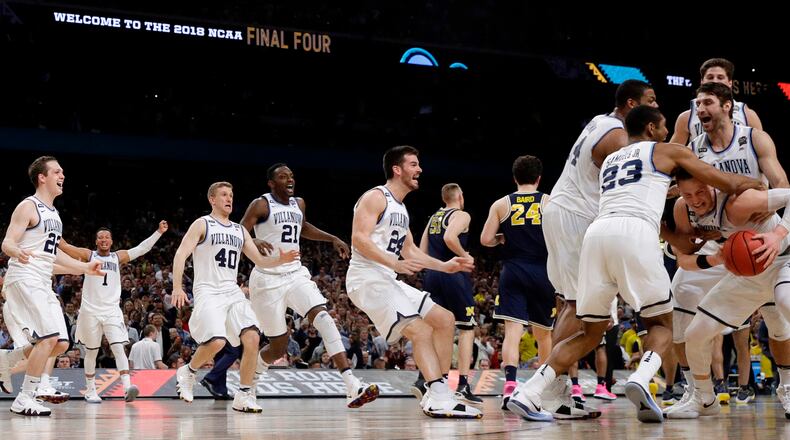It’s often said, sometimes even by me, that the sign of a great team is to win on an off-night. On its off-night, Villanova won the national championship.
This wasn’t the Villanova of Saturday, when the Wildcats blitzed Kansas with 13 first-half 3-pointers en route to a 17-point victory. The result, however, was the same – a 17-point victory. Villanova’s biggest lead against Michigan on Monday night was 22 points, just as it had been against the Jayhawks.
This will sound odd, given that the Wolverines lost 79-62, but they got the game they wanted – for 14 minutes. Moritz Wagner, known as Moe, had outscored Villanova 9-8 at the first TV timeout. Michigan would assume a seven-point lead after nine minutes. The Wildcats missed nine of their first 10 trey tries. For a millisecond, you wondered if a massive upset was in its formative moments.
Then Villanova nosed ahead, and that was pretty much that. The Wildcats’ lead was 30-28 with 3 ½ minutes left in the half. It was 37-28 at the half. Michigan had held Nova to nine fewer 3-pointers over the first 20 than Kansas, and still the Wolverines were halfway to being blown out.
Villanova had made 55.4 percent of its shots and 59.4 percent in the semi; it made 47.4 and 37 percent in the final. It had 20 assists against Kansas; it had seven against Michigan. Two nights after six Wildcats scored in double figures, only two did. Jalen Brunson, the national player of the year, had 18 points and six assists Saturday; he had nine and two Monday. (Michigan took great pains to bump Brunson every time he got the ball.) Yet there they were – bookend 17-point victories.
Donte DiVincenzo, Brunson’s nominal backup, did in this game as Luke Hancock did for Louisville – also against Michigan – in the 2013 final at the Georgia Dome. A sub sunk the Wolverines. DiVincenzo scored 31 points on 10 of 15 shooting. He had five assists, three assists, two blocks. Of his team’s 10 treys, half were his. Inside the final 10 minutes, with Villanova sitting three of its starters with four fouls, the non-starter not only kept his team in front but padded its lead.
If there was a significant moment in a game that was never closer than 12 points over the final 18 minutes, it came when Michigan drew within 56-44. DiVincenzo rose at the top of the key and drained a 3-pointer. On the next trip, he sank another from the left wing. Both times he had hands in his face. Neither time did it matter. The lead was 18 again. Villanova was about to be a champion for the second time in three years.
Said Michigan coach John Beilein: “You can see why Villanova was the No. 1 seed and why they were in the top five all season long. You look at what they’d done in the NCAA tournament, and they were dominating everybody.
Then: “What DiVincenzo did was an incredible performance … When he made those shots (in the first half), we were like, ‘Whoa.’ ”
DiVincenzo’s 31 points were the most scored by a substitute in a championship game. Two years ago, he was on the bench wearing a suit when Villanova took its title. (He’d broken a bone in his foot before Christmas and became a redshirt.) He was the main reason it took another.
Said Brunson: “It just shows how much depth we have on this team.”
Entering the final, Villanova had won its five NCAA tournament games by average of 17.8 points. On Monday night, the Wildcats lost 0.1 off that yield. Since the tournament expanded in 1985, four teams have won six consecutive games by double figures. The previous three: Michigan State in 2000, Duke in 2001, North Carolina in 2009. These Wildcats can stand with any of those; indeed, they can stand with any team of the past 20 years.
Beilein again: “That’s a tremendous basketball team. That team could win a lot of Final Fours, not just the 2018 one.”
Villanova’s starting point guard was the nation’s best player. His understudy was the Final Four MVP. On a night when its rain of treys was limited to a relative drizzle, it still won breezing. There was no need to make 78.6 shots, as happened with this program against Georgetown in 1985. There was no need for an adroitly executed full-court set culminating in Kris Jenkins’ winning 3-pointer off Ryan Arcidiacono’s feed, as happened in 2016 against North Carolina. This was just standard-issue domination.
Beilein yet again: “This is the way they play. They do this every day.”
Thus did a tournament that produced the first 16-over-1 upset, the first regional to lose its top four seeds before the Sweet 16 and only the fourth No. 11 seed to reach the Final Four end with the pre-tournament favorite cutting the nets. As much as we love upsets, at journey’s end it’s nice to be able to say that the best team won. Villanova was the best team by some distance. It’s also – and again – the national champ. Justice was done here.
About the Author
The Latest
Featured



